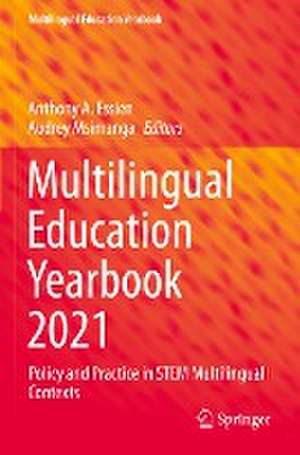Multilingual Education Yearbook 2021: Policy and Practice in STEM Multilingual Contexts: Multilingual Education Yearbook
Editat de Anthony A. Essien, Audrey Msimangaen Limba Engleză Paperback – 6 mai 2022
This book is of interest to stakeholders involved in STEM education such as researchers, undergraduate and graduate students, tertiary level teachers, teacher educators, curriculum developers as well as other professionals with responsibilities in STEM education subjects. The book is written in a way that is accessible to a wide range of backgrounds, including those who are in language education.
| Toate formatele și edițiile | Preț | Express |
|---|---|---|
| Paperback (1) | 890.26 lei 6-8 săpt. | |
| Springer International Publishing – 6 mai 2022 | 890.26 lei 6-8 săpt. | |
| Hardback (1) | 1004.00 lei 6-8 săpt. | |
| Springer International Publishing – 5 mai 2021 | 1004.00 lei 6-8 săpt. |
Preț: 890.26 lei
Preț vechi: 1085.69 lei
-18% Nou
Puncte Express: 1335
Preț estimativ în valută:
170.36€ • 179.14$ • 140.76£
170.36€ • 179.14$ • 140.76£
Carte tipărită la comandă
Livrare economică 16-30 aprilie
Preluare comenzi: 021 569.72.76
Specificații
ISBN-13: 9783030720117
ISBN-10: 303072011X
Ilustrații: XX, 255 p. 29 illus., 11 illus. in color.
Dimensiuni: 155 x 235 mm
Greutate: 0.42 kg
Ediția:1st ed. 2021
Editura: Springer International Publishing
Colecția Springer
Seria Multilingual Education Yearbook
Locul publicării:Cham, Switzerland
ISBN-10: 303072011X
Ilustrații: XX, 255 p. 29 illus., 11 illus. in color.
Dimensiuni: 155 x 235 mm
Greutate: 0.42 kg
Ediția:1st ed. 2021
Editura: Springer International Publishing
Colecția Springer
Seria Multilingual Education Yearbook
Locul publicării:Cham, Switzerland
Cuprins
Chapter 1. Challenges And Opportunities From Translingual Research On Multilingual Mathematics Classrooms.- Chapter 2. Appreciating The Layered And Manifest Linguistic Complexity In Mono-Multi-Lingual STEM Classrooms: Challenges And Prospects.- Chapter 3. Approaches That Leverage Home Language In Multilingual Classrooms.- Chapter 4. Creating Dialogues In Whole Class Teaching In Multilingual Classrooms: Language Practices And Policy Imperatives.- Chapter 5. Multiple Monolingualism Versus Multilingualism? Early Grade Mathematics Teachers’ And Students’ Language Use In Multilingual Classes In South Africa.- Chapter 6. Practices In STEM Teaching And The Effectiveness Of The Language Of Instruction: Exploring Policy Implications On Pedagogical Strategies In Tanzania Secondary Schools.- Chapter 7. Individual Language Planning For Self-Directed Learning In Multilingual Information Technology Classrooms.- Chapter 8. Using Interactive Apps To Support Learning Of Elementary Maths In MultilingualContexts: Implications For Practice And Policy Development In A Digital Age.- Chapter 9. Noticing Multilingual And Non-Dominant Students’ Strengths For Learning Mathematics And Science.- Chapter 10. Multilingual Students Working With Illustrated Mathematical Word Problems As Social Praxis.- Chapter 11. Language Policy For Equity In University STEM Education In Postcolonial Contexts: Conceptual Tools For Policy Analysis And Development.- Chapter 12. The Place Where Languages Meet To Argue: A Contribution From An Analysis Of The Brazilian National Curriculum.- Chapter 13. Principles For Curriculum Design And Pedagogy In Multilingual Secondary Mathematics Classrooms.
Notă biografică
Anthony A. Essien is an Associate Professor and the Head of the Mathematics Education Division at the University of the Witwatersrand, South Africa. He is a series editor of the book series Studies on Mathematics Education and Society. His field of research is in mathematics teacher education in contexts of language diversity. He is also a current member of the International Committee (Board of Trustees) for the International Group for the Psychology of Mathematics Education (IGPME). Anthony also served as an associate editor of Pythagoras, the academic journal of the Association for Mathematics Education of South Africa, for 11 years. In addition to his background in mathematics education, Anthony also has a background in Philosophy.
Audrey Msimanga is an Associate Professor of Science Education, currently the Head of Education at Sol Plaatje University as well as a Visiting researcher at the University of the Witwatersrand. Audrey hasworked in Biology research and then in Science Education for over 30 years. Audrey’s research seeks to understand the role of social interaction in science learning; the potential for classroom talk to mediate learner meaning making as well as the role of language in science teaching and learning in multilingual classrooms. Audrey is currently an Associate Editor for the Journal for Research in Science Teaching (JRST).
Audrey Msimanga is an Associate Professor of Science Education, currently the Head of Education at Sol Plaatje University as well as a Visiting researcher at the University of the Witwatersrand. Audrey hasworked in Biology research and then in Science Education for over 30 years. Audrey’s research seeks to understand the role of social interaction in science learning; the potential for classroom talk to mediate learner meaning making as well as the role of language in science teaching and learning in multilingual classrooms. Audrey is currently an Associate Editor for the Journal for Research in Science Teaching (JRST).
Textul de pe ultima copertă
This edited book attempts to foreground how challenges and complexities between policy and practice intertwine in the teaching and learning of the STEM subjects in multilingual settings, and how they (policy and practice) impact on educational processes, developments and outcomes. The unique feature of this book, thus, lies in its combination of not just language issues in the teaching and learning of the STEM subjects, but also in how these issues relate to policy and practice in multilingual contexts and how STEM research and practice may inform and shape language policies and their implementation in multilingual contexts.
This book is of interest to stakeholders involved in STEM education such as researchers, undergraduate and graduate students, tertiary level teachers, teacher educators, curriculum developers as well as other professionals with responsibilities in STEM education subjects. The book is written in a way that is accessible to a wide range of backgrounds, including those who are in language education.
Caracteristici
Explores how STEM education policy is deconstructed and reconstructed in practice in different multilingual contexts Discusses the challenges and complexities between policy and practice in STEM education Highlights how STEM research may impact educational processes and outcomes in multilingual contexts




